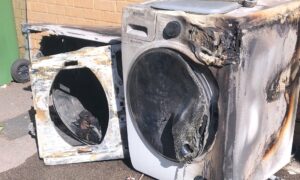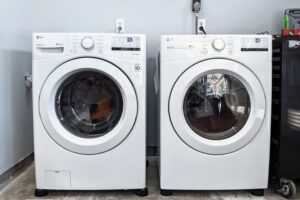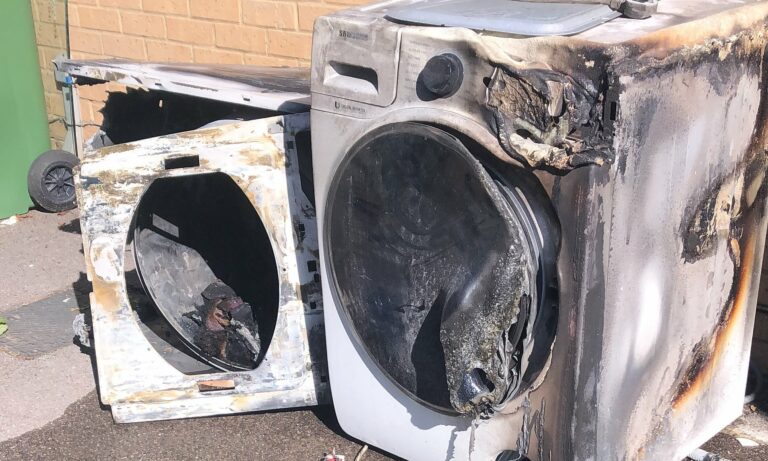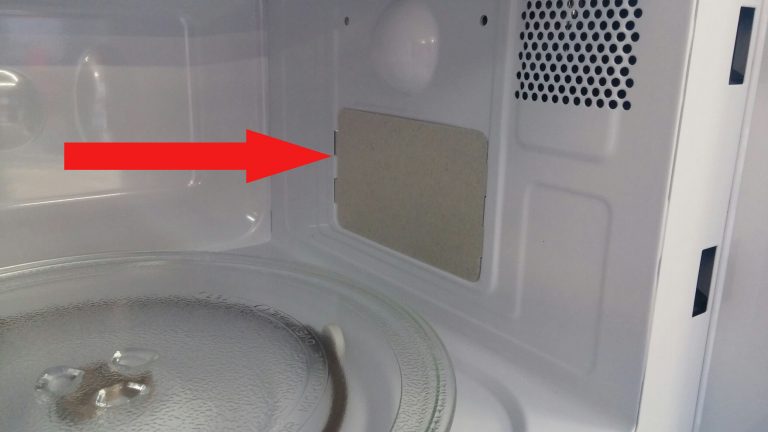Can a Washing Machine Explode? (All You Need To Know)
Washing machines are one of the most reliable and vital appliances anyone can own. The process is straightforward.
All you have to do is sort your laundry, put it in the machine, push some buttons, and let the machine do its thing – giving you the time to relax or do something else.
However, given that home appliances cause most household fires, you may want to know how likely your washing machine will be a culprit.
Washing machines can explode. Research shows that of all household appliances that cause fires, washing machines have a 14% probability. Most washing machine explosions happen because of overloading, so different brands equip their machines with safety mechanisms to prevent explosions. However, these explosions still happen, sometimes resulting in a fire.
This article will consider why washing machines explode or cause fires and what you can do to prevent these accidents.
By the end, you will know everything concerning the principles surrounding washing machines and explosions.
Can Washing Machines Explode?
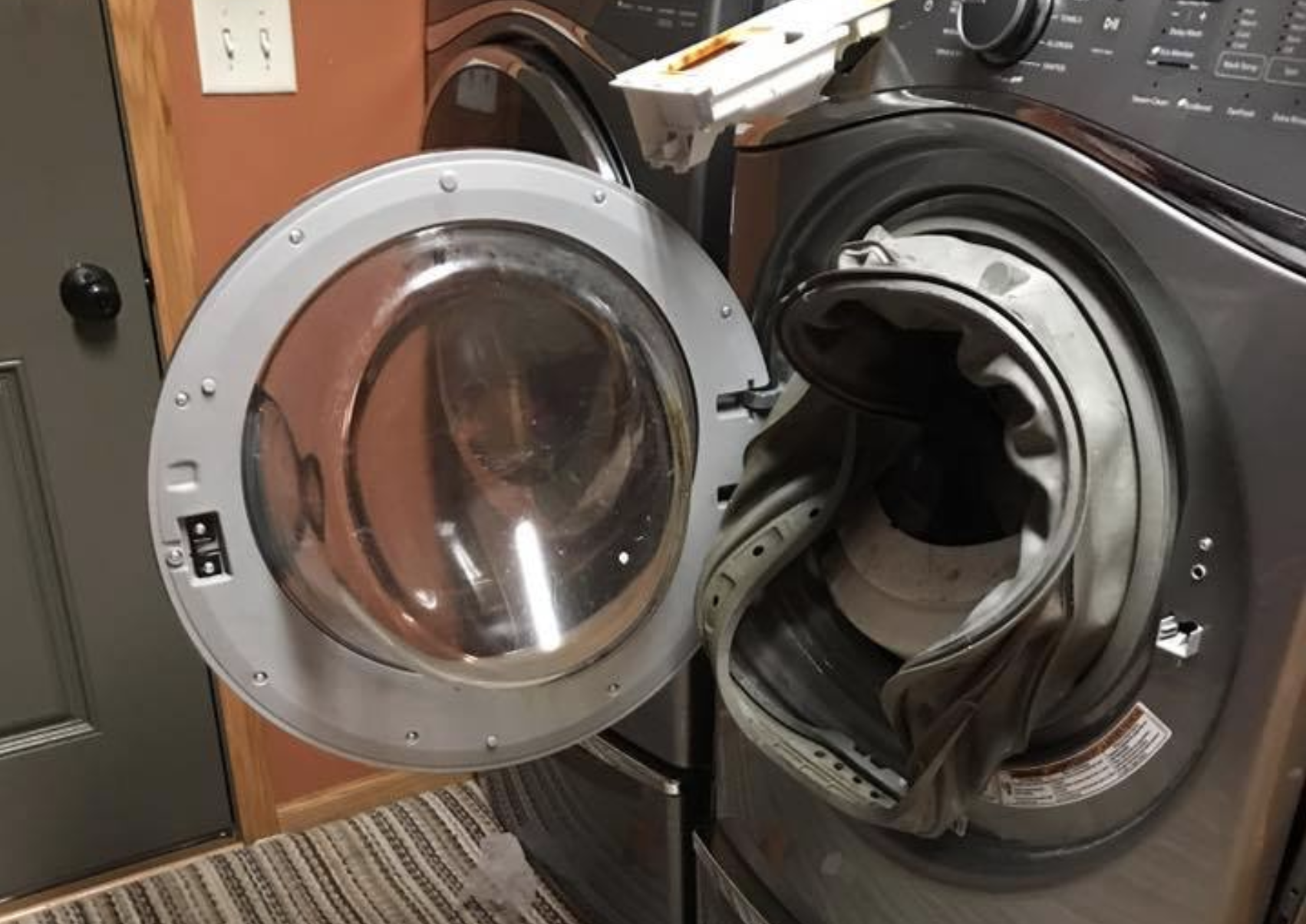
While it is not a common occurrence, washing machines can explode.
Over the past decade, there have been many reports of washing machines exploding in the middle of a cycle.
This unfortunate occurrence is not restricted to any type or brand of washing machine. It can happen with top or front loaders of different brands.
Over the last decade, reports of exploding washing machines cut across well-known brands like Samsung, Whirlpool, Maytag, and some lesser-known brands.
However, considering the explosions, front loaders are more likely to explode than top loaders.
In 2018, Samsung recalled about three million washing machines due to explosion reports.
Also, in August 2022, the brand announced they would offer free repairs for the Bespoke Grande AI washing machines from August 22 through November 30 in Korea.
These repairs are due to the explosion reports that came in the preceding months.
Why Do Washing Machines Explode?
There are different reasons why washing machines explode; among them are the following:
Overloading the Washing Machine
Overloading is one of the most common reasons why washing machines explode.
Typically, these appliances are designed to hold a certain quantity of laundry, irrespective of the drum size.
However, most users fill the drum sometimes to cut down laundry time. Usually, newer models have a program that allows them to detect and prevent overload.
The problem arises when the overload mechanism fails, leading to self-destruct.
As the drum attempts to move to wash the clothes, it hits the body of the washer to the point of breaking.
The explosion happens when the pressure accumulates, and the drum dislodges while the motor runs. The possibility of explosion grows higher with faster wash and spin cycles.
The explosion effects vary from damage to the machine, other property, or humans in the vicinity during the accident.
Most models include the ideal clothes weight you are to wash per cycle. But, if you do not have access to your user manual, you can use a manual gauge.
Fill the drum halfway with clothes so there is enough space for the drum to rotate without strain.
Metals Hitting the Door
Though this reason is rare, it is a possibility. When things like coins, buckles on trousers, and other metals hit the door over and over, it can cause a strain on the washing machine door.
For this reason, the effect usually compounds and will only take something minor to trigger.
Exploding washing machines may only sometimes be because of metals or overloading. Sometimes, it could be some mechanical malfunction that you cannot help.
However, it would be best if you did the right thing and exercised caution by:
- Putting an ideal amount of laundry in the machine at a time.
- Removing all possible metals from clothes before washing.
- Reducing your machine’s spin speed to about 800 to 1000 revolutions per minute (rpm).
Can Overloading a Washing Machine Cause a Fire?
As we have already seen, overloading a machine can result in an explosion. And this can lead to fires.
However, the chances of a fire starting from an overload explosion depend on whether there were underlying electrical defects.
If your washing machine has electrical faults, the explosion may trigger a spark which could lead to a fire, especially if there is kindling in the vicinity.
In 2019, the National Fire Protection Association revealed that The US fire departments respond to about 16,000 washing machine and dryer-related fires.
And of this number, 8% come from regular washing machines.
The common ways washing machine fires start summarized in the table below.
| Kindling | Percentage |
|---|---|
| Electrical wires and insulation | 26% |
| Appliance casing | 24% |
| Appliance belts (e.g., conveyor or drive belt) | 11% |
| Clothing | 8% |
| Dust or fiber | 3% |
| Linen | 2% |
Asides from overload explosions, there are other ways washing machines can start a fire.
These ways include:
- Faulty, worn wires can start sparks and catch on appliance casing or cables.
- The appliance’s belts can wear out and overheat.
- Motor malfunction can start a fire inside the washing machine
- Block drain pumps can lead to overheating, which in turn causes fires.
- Overloading can lead to excessive drum vibrations, making electrical components short-circuit.
Considering these points, other reasons why you should not overload your washing machine are:
It Reduces Wear and Tear
When you overload your washing machine, it causes a strain on the appliance to spin the drum.
This strain negatively affects the motors and other components, leading to a degradation of these parts.
Eventually, these parts do not live up to their life expectancy and require repairs (which are usually expensive).
Sometimes, it can affect the machine’s major components causing a total breakdown.
If you do not overload your machine, you reduce these effects, and your machine can work more effectively.
Your Clothes Are Cleaner
When you overload your machine, there needs to be more space for water and detergent to cycle with all the clothes.
Most modern machines have a self-preservation mechanism where the speed automatically drops when the drum is overloaded.
This speed reduction also causes longer wash cycles and, of course, unclean clothes.
So, to ensure you have clean clothes, endeavor not to overload your machine, allowing the clothes enough vibration and wash space at the right speed.
How Common Are Laundry Fires?
Laundry fires are more common than you can imagine.
Some surveys rank washing machines as the sixth type of appliance that can cause a fire – after tumble dryers, microwave ovens, toasters, hot plates, and cookers (which rank first on the list).
Of all laundry appliances, dryers are the most likely culprits, as they are responsible for about 90% of all laundry fires.
The remaining 8% falls to washing machines and dryer/washer combinations.
There are several causes of dryer fires; they include:
Clogged Ducts and Lint Build-up
Lint will build up if you do not clear the exhaust duct regularly. This build-up prevents the proper circulation of heated air which can cause temperature imbalance and sometimes a fire.
Clogged ducts can also reduce the rate at which clothes dry, placing a strain on the machine.
Plastic Dryer Ducts
Most brands use plastic ducts for flexibility, but this property makes the machine more likely to catch fire.
For this reason, brands are advised to use flexible ducts approved by UL or other product safety testing agencies.
Overloading
When you overload your dryer, you place more strain on the machine, leading to overheating and sometimes a fire.
You can avoid this by putting a reasonable amount of clothes in the dryer at a time.
You May Like To Read
- Are Washing Machines Tested Before Delivery? (Explained)
- Does TV Remote Come Under Warranty? (Quick Answer)
- These Washing Machines Expert Always Recommend!
- 4 Reasons That Washing Machines Are in The Kitchen!
- What Does It Mean When A Microwave Gets Hot On The Outside?
- 5 Reasons That Microwave Plates Break!







